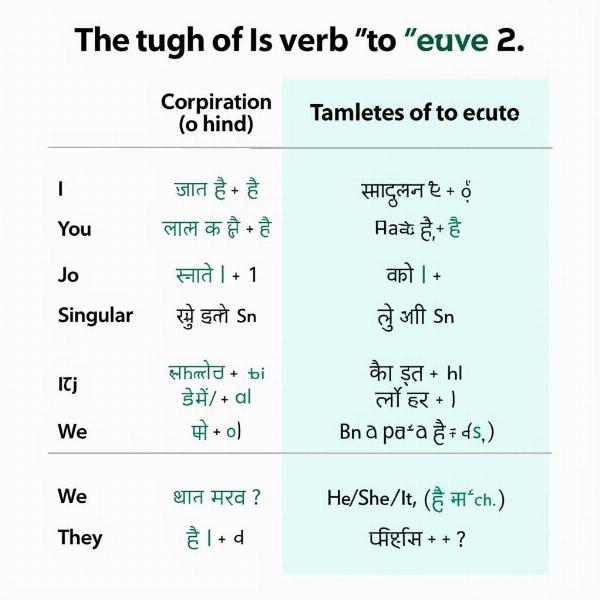“I has” is grammatically incorrect in English. While you might encounter it occasionally in informal settings or humorous contexts, it’s crucial to understand that the correct form is “I have.” This article delves into the proper usage of “I have” and explores its Hindi translations, ensuring you communicate accurately and effectively. It also provides context for why “I has” is incorrect and offers insights into commonly used Hindi verbs for possession and existence.
Understanding the correct usage of “I have” is fundamental to English grammar. “Have” is an auxiliary verb used to express possession, experience, or actions. When used with the first-person singular pronoun “I,” it always takes the form “have.” The incorrect form “I has” stems from a misunderstanding of subject-verb agreement, where the verb form needs to align with the subject.
Exploring the Hindi Translations of “I Have”
The Hindi translation of “I have” depends on the context. Here are some common translations:
-
Mere paas hai (मेरे पास है): This is the most common and literal translation, meaning “near me is.” It emphasizes possession of a physical object or tangible item. For example, “I have a book” translates to “Mere paas ek kitaab hai (मेरे पास एक किताब है).”
-
Mujhe hai (मुझे है): This translation is often used for experiences, feelings, or conditions. For instance, “I have a headache” translates to “Mujhe sar dard hai (मुझे सर दर्द है).”
-
Main rakhta/rakhti hoon (मैं रखता/रखती हूँ): This emphasizes the act of keeping or possessing something. The form changes based on gender: rakhta for male and rakhti for female.
Common Mistakes and How to Avoid Them
One of the most common mistakes is using “I has.” Remember, the correct form is always “I have.” Another mistake is using the incorrect Hindi translation based on the context. Using mere paas hai for an experience like having a fever would be incorrect.
Practical Examples of “I Have” in Hindi
- I have a car: Mere paas ek car hai (मेरे पास एक कार है)
- I have a question: Mera ek prashn hai (मेरा एक प्रश्न है)
- I have a cold: Mujhe zukhaam hai (मुझे जुकाम है)
- I have a sister: Meri ek behen hai (मेरी एक बहन है)
Why Understanding “I Has” is Important
While “I has” might be used humorously, understanding why it’s incorrect is essential for learning proper English grammar. Using the correct form “I have” ensures clear communication and avoids misunderstandings.
Using “Have” with Other Pronouns
It’s also important to remember how “have” is used with other pronouns:
- He/She/It has: Used with third-person singular pronouns.
- We/You/They have: Used with plural pronouns.
 Using Have with Other Pronouns in Hindi
Using Have with Other Pronouns in Hindi
Conclusion
Understanding the meaning and usage of “I have” and its correct Hindi translations is crucial for effective communication. While “I has” is grammatically incorrect, learning why helps build a strong foundation in English grammar. Mastering the different Hindi translations based on context ensures accurate and nuanced expression. Remembering these points will enhance your ability to speak and write both English and Hindi fluently.
FAQs
- Is “I has” ever grammatically correct? No, “I has” is never grammatically correct in standard English.
- What is the most common Hindi translation of “I have”? Mere paas hai is generally the most common translation.
- How do I choose the right Hindi translation for “I have”? The context determines the correct translation. Use mere paas hai for possessions and mujhe hai for experiences or conditions.
- What is the difference between rakhna and mere paas hai? Rakhna emphasizes the act of keeping or possessing, while mere paas hai indicates possession.
- Why is it important to use the correct form of “have”? Using the correct form ensures clear communication and demonstrates grammatical proficiency.
- What are other ways to express possession in Hindi? Other ways include using ka/ki/ke (का/की/के) to indicate possession.
- Where can I learn more about Hindi grammar? Meaning-Hindi.in offers various resources to further your understanding of Hindi grammar and vocabulary.
Meaning-Hindi.in is your one-stop solution for professional Hindi translation services. We offer a wide range of services, including business and commercial document translation, certified and legal document translation, technical and user manual translation, website and localization, educational and academic document translation, and express translation services. Our expert linguists ensure accurate and culturally sensitive translations, catering to diverse needs. Contact us at [email protected] or call us at +91 11-4502-7584 for high-quality Hindi translations. Meaning-Hindi.in is committed to bridging the communication gap between Hindi and other languages, empowering individuals and businesses to connect effectively with the Indian market.